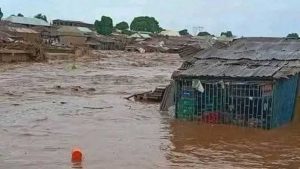Tears of Mokwa: When the Water Turned Against Us…
Our Sisters in Fuka, Northern Nigeria tell us about a recent flood. Among the many who lost their lives were a local priest, Fr. James Omeh, and a candidate preparing to join MMM, Charity John.
It was past midnight when the sound of thunder broke the stillness of Mokwa’s sky. For hours, the rain had pelted the tin roofs relentlessly. Then suddenly, the waters came—not the trickle of a seasonal flood, but a roaring deluge. By dawn, the entire town was submerged.
The floods that devastated Mokwa and its surrounding communities in Niger State on 28th and 29th May 2025 are still fresh in our hearts. Homes disappeared under water. Fields were reduced to brown lakes. Children cried for mothers who could not answer. And those who survived now walk among ruins, searching not just for belongings, but for pieces of their lives.
 Over 200 people lost their lives. At least 500 are still missing, likely swept away in the midnight chaos. Survivors tell haunting stories. One man, eyes hollow from grief, recounted, “I watched helplessly as the flood washed away my wife and our newborn baby,” Another family lost nine members in a single night.
Over 200 people lost their lives. At least 500 are still missing, likely swept away in the midnight chaos. Survivors tell haunting stories. One man, eyes hollow from grief, recounted, “I watched helplessly as the flood washed away my wife and our newborn baby,” Another family lost nine members in a single night.
As we reflect on this tragedy, the song “Water No Get Enemy” comes to mind. According to the musician Fela Kuti, whether you are a child or an elder, once water touches your hand, you must not throw it away…. Indeed, water has no enemy. It gives life, feeds our crops, and cleanses our bodies. But this time, it betrayed us. Or did we betray it first? What are the implications? Where do we begin to count the costs, our loss and our pains?
The Human Cost
In just hours, over 3,000 homes and another 265 homes were damaged and destroyed beyond repair. Bridges collapsed, roads washed away, and entire villages, especially low-lying farming communities along the River Kaduna were erased. People now sleep in temporary shelters with little food, no clean water, and fading hope. More than 1,000 people were injured, and 3,000 were displaced, according to emergency agencies. Markets are shut. Schools have become camps. The once-bustling heart of Mokwa now beats slowly, burdened by loss.
Why Did This Happen?
Experts had long warned about the region’s vulnerability. Climate change has brought more intense and unpredictable rains. Deforestation, poor drainage, and unregulated building along floodplains left the region defenceless. Months before the disaster, Nigeria’s hydrological services warned of imminent floods in this region. But, as is too often the case, warnings echoed into silence. The response came late, and when it did, it was too little.
Healing Begins
In the days following the disaster, the Federal Government released money, food supplies, and emergency tents. Senator Sani Musa donated ₦50 million and food items. Relief agencies, including the Red Cross, WHO, and NEMA, responded swiftly, yet the needs on the ground still far outweigh the resources. Faith communities, too, have risen to the challenge. Churches opened their doors. Sisters in surrounding communities provided trauma counselling and food parcels. As always, in tragedy the Church stands as both shelter and voice.
Faith, Flood, and the Future
The flooding in Mokwa is not just a natural disaster. It is a wake-up call. It challenges us to rethink our relationship with the earth and with one another. Our faith teaches stewardship, yet our forests are gone, our rivers are choked, and our systems are broken. As the waters recede, we are left with more than mud and memories. We are left with questions. How can we better prepare? Where is our early warning system? Who speaks for the vulnerable, the voiceless, and the forgotten?
Water Still Has No Enemy
Fela Kuti was right, “water, no get enemy.” It is not the enemy, but our neglect of planning, our refusal to heed ecological warnings, and our short-term politics. The people of Mokwa need more than sympathy. They need action: sustainable housing, climate education, reforestation, and stronger local governance. As a Church, as a people, and as a nation, we must do more. Let us not wait for the next flood. Let us build for the future on higher ground, with deeper compassion, and a stronger sense of responsibility.
